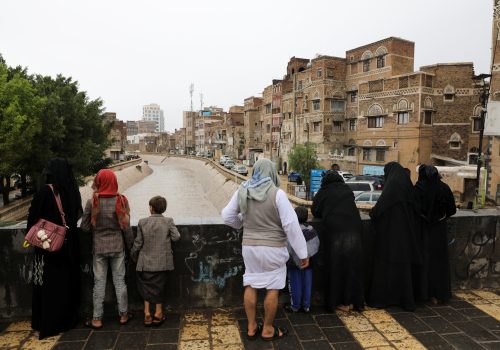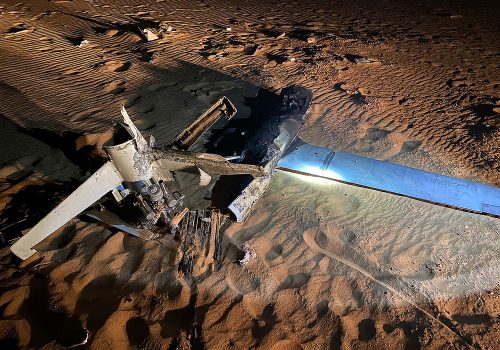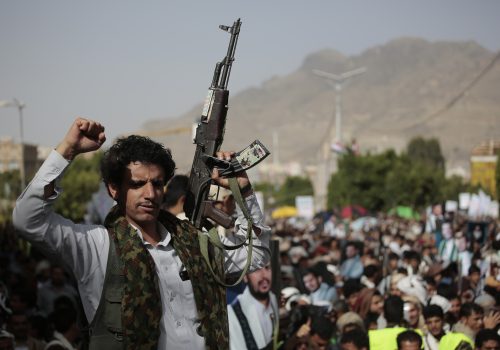The Islamic Republic exported its revolution to my country, Yemen. The international community must do more to stop this.
Editor’s note: This article was updated on July 21, 2023
On July 5, US Central Command declared that it thwarted an Iranian attempt to seize Bahamas and Marshall Islands-flagged oil tankers near the Strait of Hormuz. A day later, the US Fifth Fleet announced that the Islamic Revolutionary Guard Corps-Navy (IRGC-N) had seized a merchant vessel in international waters near the Gulf and that the US Navy had deployed ships to monitor the situation closely.
These recent piracy incidents by the IRGC-N in international waters are not the first. Since 2021, Iran has targeted twenty commercial vessels in continuation of the deep-rooted terrorism it has been practicing since the 1979 revolution, which brought about the Islamic Republic by Ayatollah Ruhollah Khomeini, including through its proxies in the region.
The escalation came months after the March 1 announcement that the Saudi and Iranian sides had reached—an agreement sponsored by China—to restore diplomatic relations between them within two months after a seven-year break. (Ties had ceased when mobs stormed Saudi missions in Mashhad and Tehran after the execution of Saudi Shia cleric Nimr al-Nimr.) This was part of relentless efforts and endeavors made by the leadership of the Kingdom of Saudi Arabia to settle crises, heal the rift, solve outstanding problems between the countries of the region, curb interference in the affairs of Arab countries, and establish healthy relations based on the principle of non-interference, respect for national sovereignty, and the exchange of common interests. The moment was considered an opportunity for the Iranian regime to review its malign behavior, respect the principles of the United Nations Charter and international laws and treaties, and refrain from sponsoring its Shia militias and using them to implement its destructive policies.
However, since the agreement’s signing, the Islamic Republic’s conduct remains unchanged, with ongoing support for militias that spread chaos, terrorism, and threaten international interests. Tehran’s actions pose a persistent danger not just to the region but the international community, as it seeks to alter the region’s political, cultural, and ideological balance through force. Iran is determined to export its revolutionary model, also known as the “Khomeinist revolution,” which was named after Khomeini. It does so by expanding its geographic and cultural influence through support to Shia militias like the Houthis in Yemen to consolidate its power internally and externally.
The Islamic Republic, which spends generously on militias loyal to it and finances all their malign activities, not only provides them with weapons and money but also provides training and combat tactics. Tehran considers its militias, including the Houthis, closer to it than the average Iranian citizen who does not believe in its ideology. Herein lies the danger: the Islamic Republic works to undermine the stability and independence of regional states in exchange for empowering its militias, even if that means doing so on the ruin and destruction it has caused. This is no more evident than in Yemen, where the world’s most humanitarian crisis is exacerbating, and one of the most complex and bloody conflicts in the world is taking place.
In Yemen, the people are still paying the price for the Iranian regime’s policy: its expansionist ambitions and blatant interference in Yemen’s internal affairs, which reached its climax with the Houthi militia’s coup against the state in 2014 (aided by Iranian support, financing, and planning).
Iran continues to play a major role in the continued smuggling of weapons and drugs to the Houthis in violation of United Nations Security Council Resolution 2216, disrupting initiatives and efforts made by neighboring countries—led by Saudia Arabia—and the international community to de-escalate and restore the UN-sponsored truce, and standing as a stumbling block to efforts to end the war and bring about a comprehensive, just, and sustainable peace. Additionally, Iran disregards the heavy bill of losses and the complex economic and humanitarian conditions that Yemenis are experiencing due to the war triggered by the coup.
Indeed, the Yemeni experience of Iranian influence since the emergence of the Houthis as an armed militia in 2003, which is supported directly by Iran, is strong evidence of the damage wrought by four decades of Iranian expansionist policies and hegemonic ambitions in Lebanon, Syria, Iraq, and now Yemen.
Anyone who has visited Sana’a, the capital of Yemen, before it fell into the hands of the Houthis and pays a visit today will understand the meaning of exporting the Iranian revolution. Today, the capital displays billboards of pictures of Iranian religious and military leaders, including the IRGC—a US-designated terrorist organization—such as the late Quds Force commander Qasem Soleimani and Abu Mahdi al-Muhandis, the late deputy of the Iran-backed Popular Mobilization Forces in Iraq (both were assassinated in a US drone strike in Baghdad in 2020).
Furthermore, while preparations are being made for the closure of the Yali Institute, which specializes in teaching English, Persian language education is being taught in universities and institutes, and some children have even learned to sing Persian language songs. To add insult to injury, Houthis have canceled the commemoration of national events and celebrations and replaced them with sectarian occasions, such as Shia mourning ceremonies (ex. Ashura) imported from Iran.
With that in mind, the international community, led by the permanent members of the United Nations Security Council, should not stand by and allow the malign behavior of the Iranian regime to go unchecked. The international community must start by designating the Houthis as a terrorist organization and sanctioning Iran for sending arms and support to the group. The international community must also support Yemeni coast guards, improve their capacity to protect Yemeni waters, and integrate them into multi-country maritime missions to protect international waters near Yemen. As talks reportedly continue to revive the 2015 nuclear deal, it is integral that Western negotiators tie the negotiations to stopping Iran’s interference in Yemen.
It is time for the international community to move decisively to carry out their legal responsibilities in maintaining international peace and security. This must be done to confront the threat posed by Tehran and its militias—foremost the Houthis—and the systematic terrorism that it practices, for which countries and peoples of the region pay a heavy toll.
Moammar Al-Eryani is the Minister of Information, Culture, and Tourism of the Republic of Yemen.
Further reading
Mon, Oct 24, 2022
Truce or no truce: Transitional justice is Yemen’s only path to healing
MENASource By
Yemen will not reach peace without a peace process that is based on human rights, gender equality, and transitional justice.
Mon, Jan 24, 2022
How the Biden administration can assure regional partners in the wake of the Houthi attacks on the UAE
MENASource By William F. Wechsler
US President Joe Biden is right to reconsider his previous decision to withdraw the US terrorist designation of the Houthis.
Fri, Jan 6, 2023
Want peace in Yemen? First, restore the balance of power.
MENASource By
Rather than giving in to the Houthis’ latest demands and withdrawing their support for pro-government forces, the UAE and Saudi Arabia should attempt to restore a balance of power in negotiations.
Image: A boy holds a poster of Houthi slain commanders during a vigil marking the one year anniversary of the killing of Iranian military commander General Qassem Soleimani and Iraqi militia commander Abu Mahdi al-Muhandis in a U.S. drone attack, in Sanaa, Yemen January 2, 2021. REUTERS/Khaled Abdullah


